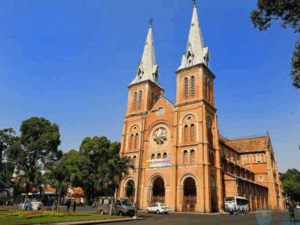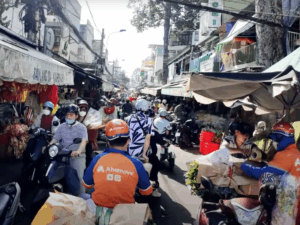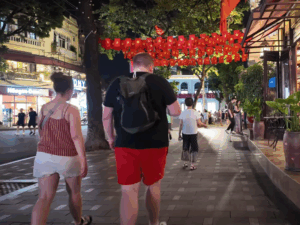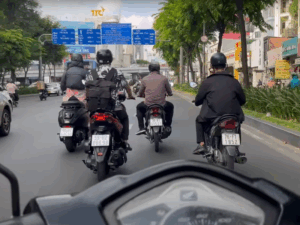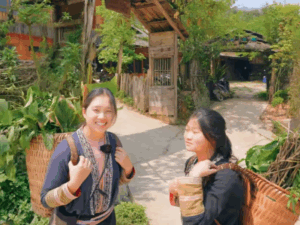Welcome to the captivating world of the Jade Emperor Pagoda, one of the most unique and mesmerizing temples in Ho Chi Minh City, Vietnam. With its intricate architecture, rich history, and spiritual significance, this temple is a must-visit for any traveler seeking an unforgettable experience. In this blog, we’ll take a closer look at the incredible Pagoda and its cultural significance, as well as provide tips for planning your visit and making the most of your time at this awe-inspiring destination.
Introduction to the Jade Emperor Pagoda
Stepping into the Jade Emperor Pagoda is like walking through a portal to another world. Nestled in bustling Ho Chi Minh City, this pagoda is a serene oasis that beckons travelers from around the globe. Established in 1909 by the Chinese community, it stands as a testament to the rich tapestry of Vietnam’s cultural and religious history. If you’re a travel enthusiast, cultural explorer, or a history buff, this enchanting temple promises a profound and unforgettable experience.
The Jade Emperor Pagoda, also known as Chùa Ngọc Hoàng, boasts a history steeped in myths and legends. Built to honor the Jade Emperor, Ngoc Hoang, the supreme Taoist god, it has served as a spiritual sanctuary for over a century. Visitors can expect to uncover the layers of history while marveling at the intricate artistry that defines this ancient structure.
In this post, we’ll take you on an immersive journey through the Jade Emperor Pagoda, exploring its cultural significance, architectural marvels, and the hidden gems in its surroundings. By the end, you’ll understand why this sacred site is a must-visit on any trip to Ho Chi Minh City.
The Significance of the Pagoda in Vietnamese Culture and Religion
The Jade Emperor Pagoda isn’t just a historical relic; it’s a living, breathing testament to Vietnam’s spiritual heart. For local Vietnamese and the Chinese community, it holds profound religious significance. It is a place where worshippers come to offer prayers, seek blessings, and find solace amidst life’s chaos.
Taoism, Buddhism, and Confucianism converge within its walls, creating a unique tapestry of beliefs and practices. The Jade Emperor, revered as the ruler of heaven, is the focal point of devotion. His statue, surrounded by other deities, radiates an aura of mystic power. For many, the pagoda is a place to seek guidance and intervention from divine forces.
In Vietnamese culture, the pagoda also symbolizes the integration of different traditions and the harmony among diverse communities. It’s not just a religious site but a cultural hub that has witnessed countless generations pass through its gates. Visiting the Jade Emperor Pagoda offers a glimpse into the soul of Vietnam, where spirituality and everyday life are deeply intertwined.
Architectural and Design Features
The Jade Emperor Pagoda is renowned for its stunning architectural details, which blend traditional Chinese and Vietnamese styles. The roof, adorned with intricate carvings of dragons and phoenixes, is a visual feast. These mythical creatures symbolize power, strength, and good fortune, setting the tone for what lies within.
Stepping inside, visitors are greeted by elaborately carved woodwork, vibrant altars, and statues that tell stories of ancient deities and legendary heroes. The pagoda’s main hall, dedicated to the Jade Emperor, is the centerpiece. Here, the deity’s statue sits majestically, surrounded by four guardians and other celestial beings.
One of the most striking features is the Hall of the Ten Hells, depicting various punishments for sins in the afterlife. It’s a vivid reminder of the moral teachings that underpin the religious practices here. Each section of the pagoda is meticulously designed to inspire awe and reverence, reflecting the skill and devotion of the artisans who built it.
Exploring the Surroundings
While the Jade Emperor Pagoda is a destination in itself, the surrounding area offers several attractions that complement your visit. Just a short stroll away is the beautiful Saigon Zoo and Botanical Gardens, perfect for a leisurely afternoon amidst nature. Opened in 1865, it’s one of the oldest zoos in the world and home to a diverse range of flora and fauna.
For history buffs, the War Remnants Museum is a must-visit. It provides a sobering yet insightful look into Vietnam’s turbulent past, particularly the Vietnam War. The museum’s exhibits, including photographs, artifacts, and military equipment, offer a stark contrast to the spiritual serenity of the pagoda.
If you’re looking to indulge in local cuisine, the nearby Ben Thanh Market is a culinary paradise. From mouth-watering street food to fresh produce and traditional Vietnamese dishes, it’s a food lover’s dream. Ending your day here with a bowl of pho or a banh mi sandwich is the perfect way to round off your cultural exploration.
Visitor Tips
To make the most of your visit to the Jade Emperor Pagoda, consider the following tips. First, plan your visit during the early morning or late afternoon to avoid the midday heat and crowds. This will allow you to explore the pagoda in a more relaxed and intimate setting.
Dress modestly as a sign of respect for the sacred space. Light, breathable clothing that covers your shoulders and knees is recommended. Comfortable shoes are also a must, as you’ll likely be doing a lot of walking, both within the pagoda and the surrounding attractions.
Don’t forget to bring a camera. The pagoda is a photographer’s delight, with its intricate details and vibrant colors providing endless opportunities for stunning shots. However, be mindful and respectful of worshippers. Some areas may have restrictions on photography, so always ask if you’re unsure.
Personal Stories and Impressions
Many travelers have left the Jade Emperor Pagoda with cherished memories and profound impressions. Jane, a travel blogger, recalls her visit as a “spiritual awakening,” highlighting the serene atmosphere and the warmth of the local worshippers. “It was like stepping into another realm, where every corner held a story waiting to be discovered,” she says.
Tom, a history enthusiast, was captivated by the pagoda’s rich heritage. “The architecture alone is worth the visit, but the real magic lies in the stories and beliefs that have been preserved here for over a century,” he shares. For him, the Hall of the Ten Hells was particularly thought-provoking.
Many visitors have also noted the sense of community that permeates the pagoda. “It’s not just a tourist site; it’s a living, breathing part of the local culture,” observes Sarah, a cultural explorer. “Interacting with the locals, hearing their stories, and participating in rituals added a whole new dimension to my travel experience.”
Conclusion
The Jade Emperor Pagoda stands as a timeless beacon of spirituality, culture, and history in the heart of Ho Chi Minh City. Its intricate architecture, deep-rooted significance in Vietnamese culture, and the serene atmosphere it offers are unmatched. Whether you’re a seasoned traveler, a cultural enthusiast, or someone seeking a deeper connection with the world around you, this pagoda promises a profound and enriching experience.
The Jade Emperor Pagoda is a true treasure of Ho Chi Minh City, offering a glimpse Vietnam’s rich history and spiritual traditions. This charming temple is a must-visit for anyone looking for an immersive cultural experience that will leave them in awe. By immersing yourself in the local customs and the serene beauty of the temple, you will walk away with a deeper understanding of Vietnamese culture and spirituality. We hope this guide has helped you plan your visit to the Pagoda and made your trip all the more memorable.
Ready to explore? Plan your visit to the Jade Emperor Pagoda and immerse yourself in its timeless allure. And don’t forget to share your experiences and photos with us. Your story could inspire the next traveler to discover this hidden gem!
Join our community of explorers and share your adventures on social media using #JadeEmperorPagoda. Let’s celebrate the beauty and heritage of this incredible site together!
- Uncover Cambodia’s Hidden Charms 6 Days / 5 Nights (173 views)
- The Best Exotic Vietnam – 16 Days / 15 Nights (116 views)
- The 10 Best Tour Operators in Vietnam for 2025: An Expert, Objective Review (90 views)
- Discover the Enchanting Culture of Hanoi in Every Sense (80 views)
- Seamless Cruise: Halong Bay to Da Nang – Fostering smooth travel experience from Halong Bay to Da Nang. (76 views)

